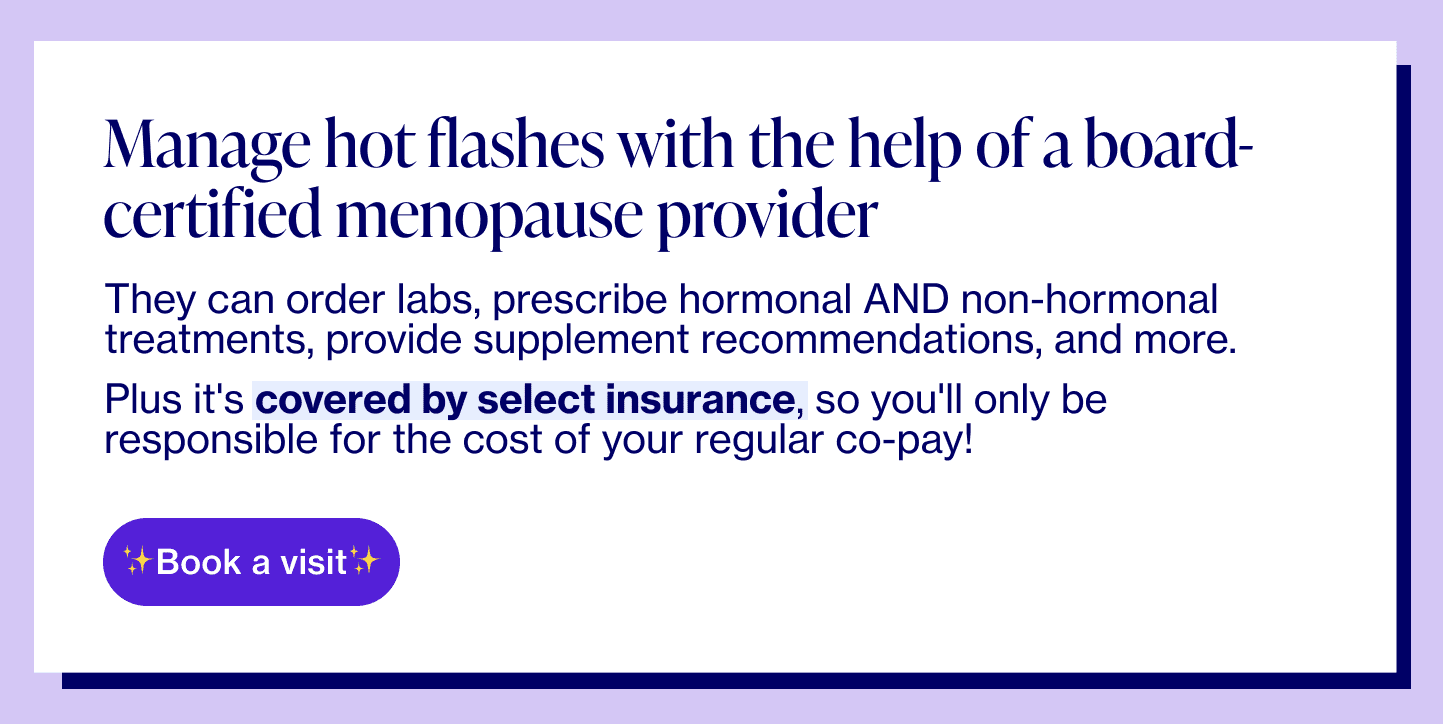
Published on May 22, 2023
Last modified on Apr 08, 2025
There’s A New Non-Hormonal Treatment For Hot Flashes!
4 min read
In 2023, the U.S. Food and Drug Administration (FDA) approved VEOZAH™ (fezolinetant) from Astellas for the treatment of moderate to severe vasomotor symptoms (aka menopausal hot flashes and night sweats). It’s taken once daily as an oral pill.
This is BIG news!! Hot flashes are one of the most common — and, frankly, most annoying — menopause symptoms, so having more treatment options in our toolkit is worth celebrating.
Below, we break down what you need to know about this groundbreaking new treatment and what it could mean for you.
How is VEOZAH™ different from other treatment options for hot flashes?
In technical terms: this is the first non-hormonal neurokinin 3 (NK3) receptor antagonist approved to treat hot flashes.
What that means, in non-science speak: it works by binding to and blocking the activities of the NK3 receptor, which plays a role in the brain’s regulation of body temperature.
Tell me more about NK3
Before menopause, the body maintains a healthy balance of estrogen and NK3, which helps keep our temperature in check. But during menopause, estrogen levels drop and NK3 surges. The result? Hot flashes and night sweats.
VEOZAH™ helps the body restore healthy temperature regulation.
Soooo…anyone can take it?
Not quite. As with any medication, there are certain “contraindications” — or conditions/medications that preclude someone from taking the medication.
- Cirrhosis, aka liver disease
- Severe renal impairment or end-stage renal disease
- Use with CYP1A2 inhibitors (a class of medications which includes ciprofloxacin, enoxacin, fluvoxamine(a), and cimetidine)
Important: before using VEOZAH™, patients should have bloodwork done to test for liver damage. And for the first nine months on the medication, routine bloodwork should be performed every three months.
How much will it cost me?
VEOZAH™ is currently covered by several commercial insurance plans, but may require prior authorization – and sometimes a letter of appeal. With cash pay, it costs $550 for a 30-day supply…which isn’t cheap.
However, while waiting for insurance coverage approval, you may want to explore the Savings Card as well as the dedicated Patient Assistance Program. If you have commercial prescription insurance and qualify for the Veozah™ Savings Card, you may pay $0 for the first monthly prescription, then as little as $30 for each monthly refill.
Talk to me about the side effects
Potential — but rare — side effects of VEOZAH™ are:
- Abdominal pain
- Diarrhea
- Insomnia
- Back pain
What are other non-hormonal options for hot flashes?
Bayer recently submitted a New Drug application to the FDA for a non-hormonal drug called Elinzanetant, which works similarly to VEOZAH™ but on different neurotransmitters. Outside of this pending drug and VEOZAH™, there are still other non-hormonal options for hot flashes…
SSRIs and SNRIs
SSRIs (selective serotonin reuptake inhibitors) and SNRIs (serotonin and norepinephrine reuptake inhibitors) can be effective as antidepressants (Lexapro, Zoloft, Venlafaxine, Paxil, Paroxetine, and Effexor, to name a few). Lesser known fact: these medications can also be taken as non-hormonal medications to treat hot flashes/hot flushes.
By regulating serotonin levels (the “happy hormone”) and norepinephrine (our “fight-or-flight” hormone), these medications can regulate your hot flashes. If you’re interested in SSRIs or SNRIs, speak to a trusted medical provider.
Soy
Tofu lovers rejoice! Soy products contain isoflavone, a compound that helps combat hot flashes by mimicking natural estrogen. When possible, we recommend organic soy over conventionally produced. Whole soy (edamame, soy milk, tofu, miso) in moderation does not put women at an increased risk of breast cancer.
Swedish flower pollen
Swedish flower pollen can help fight hot flashes by targeting the part of your brain that controls your temperature. It’s extracted from the pollen and pistils of grasses and is not a phytoestrogen, making it a good choice for women with hormone-positive breast cancer.
Black cohosh
Also known as rattleweed and bugbane, black cohosh is a perennial herb that belongs to the buttercup family and is a common ingredient used to treat symptoms of hot flashes. Studies are mixed when it comes to black cohosh supplements, with many not showing much benefit. It’s mostly safe, but there have been rare reports of liver injury when using it.
READ MORE: Elektra Guide to Supplements for Menopause
It’s also worth avoiding spicy foods (especially late at night). In addition to bringing the heat to your dinner plate, they’ll also, well, bring YOU the heat and cause full-body flushing.
Other triggers include excess stress and alcohol (especially red wine).
Remind me again what the hormonal options for hot flashes are?
Low-dose contraceptives
Some doctors advise perimenopausal women to take low-dose birth control pills as a way to regulate hormones that impact our cycles, decrease risk of ovarian/uterine cancer, bone loss, and severe hot flashes. Compared to typical birth control pills, which contain 20-50 micrograms of estrogen, estrogen prescribed to women for menopause most often contains 10-20 micrograms. As the name suggests, this option also provides contraception, which is a common need in perimenopause because yes, you can still get pregnant!
Menopause hormone therapy (MHT)
Keep in mind that MHT (previously referred to as hormone replacement therapy or HRT) is still THE gold standard for management of menopause symptoms and has the highest reported rate of efficacy for hot flashes (as well as other symptoms such as vaginal dryness and pain with sex). Plus, it comes with the added benefits of decreased risk of osteoporosis, heart disease, diabetes, and dementia.
Estrogen-based hormone therapy comes in the form of a skin patch, gel, cream, spray, or pill. Estrogen-only therapy is generally for those who’ve had a hysterectomy. For those of us with a uterus, estrogen treatment is combined with another main female hormone, progesterone. MHT is a safe and effective treatment for most women; however, for some, it comes with increased risks of breast cancer, liver disease, and stroke — and that’s where something like VEOZAH™ can come in.
MHT always requires an individualized approach discussed with your healthcare provider. To learn more, refer to our full guide to menopausal hormone therapy (MHT).
Tissue selective estrogen complex
Tissue selective estrogen complex involves a combination of selective estrogen receptor modulators (SERMs) and estrogen, which is most often recommended to postmenopausal women for the joint purpose of vasomotor symptom treatment and osteoporosis prevention. One common brand you may have heard of is Duavee (its generic name is a mouthful: conjugated estrogens/bazedoxifene).



